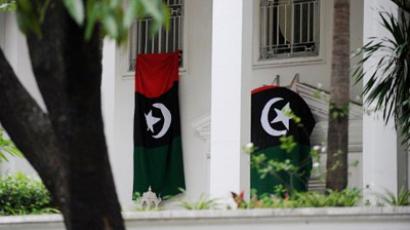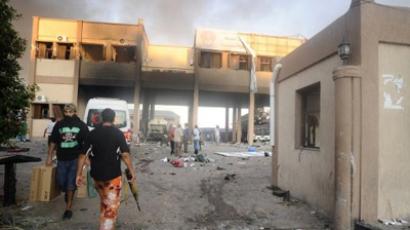NATO vows to remain in Libya
NATO says that with the Gaddafi regime ousted, it is close to success in Libya. Nevertheless, the alliance promised to remain in the region in order to secure its UN mandate.
During a briefing in Naples on Tuesday, NATO spokesperson Oana Lungescu told the media:"The NATO mission is important, it's effective and it's still necessary in order to protect civilians. As long as threats remain, there's still a job to be done and we will get that job done.”NATO is far from done with the operation in Libya despite the fall of Gaddafi's regime, said operation spokesman Col. Roland Lavoie. The alliance plans to continue supporting rebel forces as long as civilians in the country are under threat. Lavoie said that rebels and Gaddafi loyalists are negotiating the fate of Sirte, a heavily-militarized city some 250 miles east of Tripoli and the home-town of the ousted Libyan leader. However, so far Sirte shows no signs of surrendering. Negotiations with forces in Sirte are expected to end Saturday after the Muslim holiday of Eid al-Fitr, when the rebels would "act decisively and militarily," according to the head of the National Transitional Council, Mustafa Abdel Jalil. Lavoie believes it is possible for Sirte to undergo a peaceful transition from control by Gaddafi loyalists to opposition forces. "We are aware that the anti-Gaddafi forces are trying to seek a resolution, if possible without violence, to this conflict," he said.Meanwhile in Tripoli rebel leaders are trying to set up a new government amid widespread shortages of water and fuel. “Gaddafi forces have been pushed out of the greater Tripoli area. Despite the presence of remnants of the regime, the Tripoli region is essentially freed with the retreat of pro-Gaddafi forces," said Col. Roland Lavoie.The fugitive Colonel, who is nowhere to be found, remains the main target for opposition forces. The rebels are concerned that if not killed or captured, Gaddafi will stoke more violence. The Libyan Transitional government is demanding the extradition of the Colonel's family from neighboring Algeria, which has offered them shelter. This rebels claim to have killed Gaddafi’s youngest son, although that has not been independently confirmed.
“NATO can’t come up with a coherent excuse for staying in Libya”
Karl Sharro, a blogger on the Middle East, says the Libyan people should be left to decide their own fate, and that there needs to be an alternative to the Western-backed National Transitional Council.“They can’t quite come up with a coherent narrative of what their mission should be in Libya, or why they should be there at all from the beginning,” he said. “While some people are jubilant and triumphant and are saying it’s all over, we still have all these open questions and there is fighting continuing.”“The coalition stepped in and supported the [council], disproportionately giving them more power than any other possible candidate to fill this power gap in Libya,” Sharro declared.
Patrick Hayes, a reporter for the online magazine Spiked, says that NATO’s initial involvement in the Libyan conflict was an emotional reaction to try and save lives in Benghazi. “And they’ve not had, at any point, a coherent sense of what the mission is,” he said. “It is no surprise that now, when Gaddafi is gone, they are still hanging around. They are still unsure if they want to get some short-term political gains as a result of this. What they obviously don’t want is a vacuum or a big crisis to happen now, which means they will lose face.”
Ex-US presidential candidate: “NATO in Libya for oil”
Bill Van Auken, a 2004 US presidential candidate and activist for the Socialist Equality Party, says that even though NATO is using protection of civilians as an excuse to stay, its participation in this conflict has nothing to do with protecting people.“This has been a war that has been waged for definite material interest, largely oil, and geostrategic placement in North Africa, a means of countering the revolutionary upheavals that have taken place on the Libyan borders both in Tunisia and Egypt,” Van Auken declared. “NATO says it’s protecting civilians, yet it’s been leading an air war against civilians. It’s trained so-called rebels, who have now been implicated in massacres of civilians.”Auken says that NATO interference will end poorly for Libya, and constitutes “a threat throughout North Africa, and indeed across the world.”














